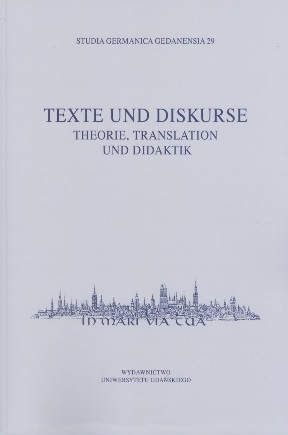The cognitive dimension of educational discourse in foreign language learning
Keywords:
educational discourse, educational goals, construction of knowledge, interactionsAbstract
Educational discourse is a specific form of communication which is related to achievement of learning objectives. Traditional education focused on the discourse from the teacher’s perspective, whereas nowadays much attention is given to learners. This is due to the perception of the learning process as a construction of knowledge. The aim of this article is to indicate the important roles of proper discourse management in the classroom and of organizing discourse in student-student interactions, as well as to emphasize the positive impact of balancing teaching activities in these two spheres.
Downloads
References
Allwright, R.L. (1981): What we want teaching materials for? In: English Language Teaching Journal 36/1, 5–18.
Becker-Mrotzek, Michael/Vogt, Rüdiger (2001): Unterrichtskommunikation. Linguistische Analysen und Forschungsergebnisse. Tübingen.
De Florio-Hansen, Inez (2003): Autonomie und Authentizität im Arbeitssprachenunterricht. Billinguales Lernen versus Kommunikativer Fremdsprachenunterricht? In: Legutke, Michael/Schocker-v.Dithfurth, Marita (Hg.) Kommunikativer Fremdsprachenunterricht: Rückblick nach vorn: Festschrift für Christoph Edelhoff. Gießen, 99–119.
Eckerth, Johannes (1998): Kognitive Aspekte sprachbezogener Lernerfragen. Baltmanns-weiler.
Eckerth, Johannes (2003): Lerner-Lerner Interaktion im Fremdsprachenunterricht. Fehlerquelle oder Lerngelegenheit in FLuL 23, 212 – 229.
Ehlich, Konrad (2007): Sprache und sprachliches Handeln. Bd. 3. Berlin.
Edmondson, Willis/House, Juliane (2003): Interaktion beim Lehren und Lernen fremder Sprachen. In: Bausch, Karl-Richard/Christ, Herbert/Krumm, Hans-Jürgen (Hg.): Handbuch Fremdsprachenunterricht. Tübingen, Basel, 242–247.
House, Juliane (2000): Interaktion und Fremdsprachenunterricht. In: Bausch, Karl-Richard/Christ, Herbert/Königs, Frank G./Krumm, Hans-Jürgen (Hg.) Interaktion im Kontext des Lehrens und Lernens. Tübingen,111–118.
Fienemann, Jutta/von Kügelgen, Rainer (2006): Formen mündlicher Kommunikation in Lehrund Lernprozessen. In: Bredel, Ursula/Günther, Hartmut/Klotz, Peter/Ossner, Jakob/Siebert, Gesa (Hg): Didaktik der deutschen Sprache. Padeborn, 133–144.
Johnson, Karen E. (1995): Understanding Communication in Second Language Classrooms. Cambridge.
Legenhausen, Lienhard (1999): The Emergence and Use of Grammatical Structures in Conversational Interactions – Comparing Traditional and Autonomous Learners. In: Missler, Bettina/Multhaup, Uwe (Hg.): The Construction of Knowledge, Learner Autonomy and Related Issues in Foreign Language Learning. Essays in Honour of Dieter Wolff. Tübingen, 27–40.
Möller Runge, Julia/Burbat, Ruth (2005): DaF Lernen und Lehren im neuen Millennium: konstruktiv, kommunikativ und kohärent. In: Info DaF 32, 359–369.
Storch, Günther (1999): Deutsch als Fremdsprache. Eine Didaktik. Theoretische Grundlagen und praktische Unterrichtsgestaltung. Stuttgart.
Strohner, Hans (1990): Textverstehen: Kognitive und kommunikative Grundlagen der Textverarbeitung. Opladen.
Tesch, Bernd (2010): Kompetenzorientierte Lernaufgaben im Fremdsprachenunterricht. Konzeptionelle Grundlagen und eine rekonstruktive Fallstudie zur Unterrichtspraxis (Französisch). Frankfurt/M.
Weskamp, Ralf (2007): Mehrsprachigkeit. Braunschweig.
Wilczyńska, Weronika (2012): Czy pojęcie dyskursu jest przydatne w glottodydaktyce [Ist der Begriff Diskurs für die Glottodidaktik nützlich?]. In: Neofilolog 38/1, 7–25.
Zabrocki, Ludwik (1975): Kybernetische Modelle der sprachlichen Kommunikation. Warszawa.
Published
How to Cite
Issue
Section
License
Copyright by Instytut Filologii Germańskiej, Wydawnictwo Uniwersytetu Gdańskiego.

 Academic Scientific Journals
Academic Scientific Journals



